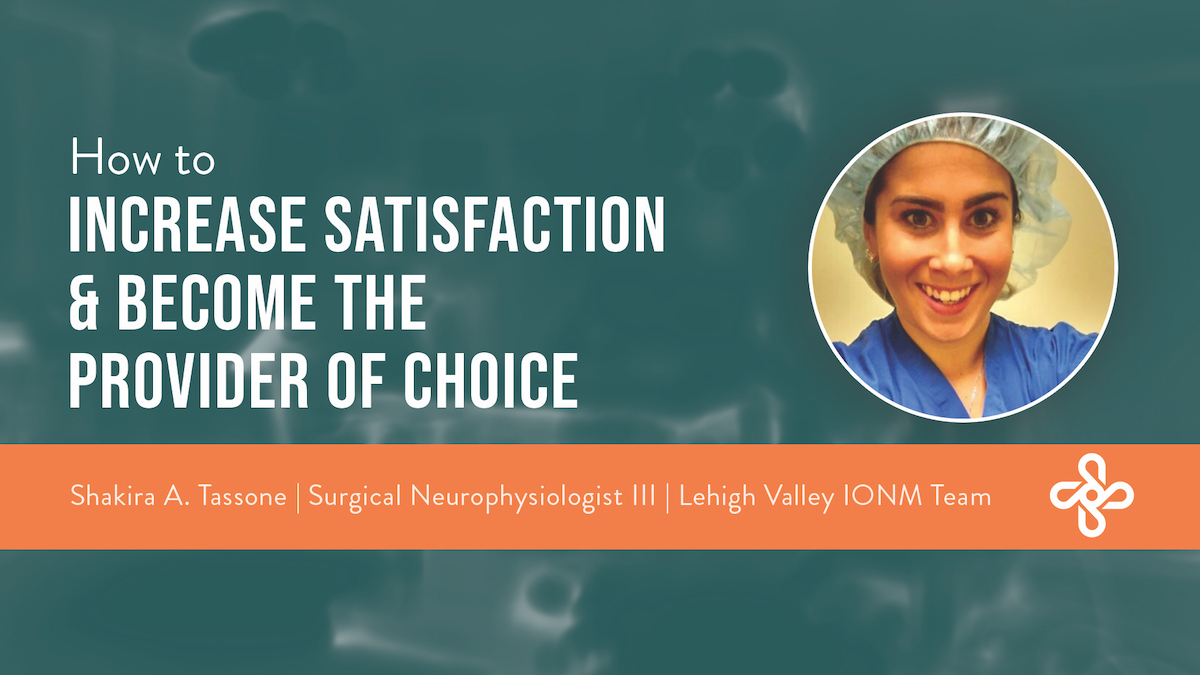
How can we as surgical neurophysiologists improve a patient’s experience and surgeon satisfaction? At SpecialtyCare, it is our responsibility to meet and interview the patient prior to surgery. We spend time reviewing information about the patient’s history, explain what neuromonitoring is, and answer any patient questions. Patient satisfaction is a key metric measured via patient surveys that give providers valuable insights into various aspects of care and how they can improve. With the development of patient centric healthcare, patients not only expect a high level of commitment from their providers, but they also want to play a more active role in managing their care. We can ensure that our patients have a positive experience through direct and indirect actions. This occurs through four pertinent touchpoints.
Effective communication between patients, surgeons, and staff is essential in creating positive outcomes. Research shows that 80% of medical errors occurred due to miscommunication between caregivers. Good communication leads to trust, and with trust, retention arises. It is one of the primary ways to reduce turnover, increase loyalty, and extend lifetime value. This quality is highly valued, particularly in the operating room. It helps to strengthen the relationship with the surgeon and staff while also building trust.
Identify the needs of your surgeon and patient quickly and efficiently. The best way to understand is by listening instead of talking. Refrain from interjecting and instead gather information from the speaker. A good listener will keep eye contact, be attentive, and wait for pauses to ask clarifying questions. Be open to feedback and address their concerns accordingly. Listening is a true skill we can all benefit from improving, it can improve your ability to influence and avoid conflict and misunderstandings.
Reduce system delays by being timely. The surgeon does not want to wait on you, nor does the patient. It speaks volumes about your dedication to the surgeon and patient by being available and ready early. Once prepared for your case, you can begin creating an uplifting environment. A lighthearted intellectual approach puts everyone at ease knowing that the providers are composed and experienced.
Provide value. This occurs by staying educated and current on new advancements in your field. When you display commitment to your craft, it speaks volumes about your dedication to the patient and surgeon to create positive outcomes. When you truly care about providing the best result, it will facilitate the retention of surgeons while improving patient satisfaction by providing extraordinary care.
Once you are able to implement these key components, it will create a positive impact on the patient and provide them with comfort knowing they received accurate and excellent care. In turn, this will drive business from patient word of mouth and create a positive work environment for the surgeon. Support the surgeon to the best of your ability and provide high-quality care for the patient and you will quickly become the provider of choice.
About the Author:
 Shakira A. Tassone, B.S, CNIM, R.EEG T, CHCA, is a Surgical Neurophysiologist III working on our Northeast District- Lehigh Valley IONM Team. Shakira will be contributing a monthly blog, casting a spotlight on the role of a surgical neurophysiologist and how this service is making surgery safer.
Shakira A. Tassone, B.S, CNIM, R.EEG T, CHCA, is a Surgical Neurophysiologist III working on our Northeast District- Lehigh Valley IONM Team. Shakira will be contributing a monthly blog, casting a spotlight on the role of a surgical neurophysiologist and how this service is making surgery safer.



Comments are closed.